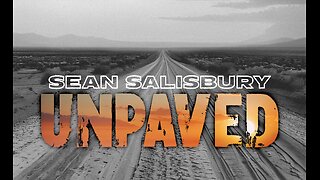Premium Only Content

Before The Great Flood - Did GIANTS Roam The Earth With Dinosaurs
The Great Flood is a common theme found in various cultures and religions worldwide. It generally refers to a catastrophic deluge that covers the Earth and often serves as a means of purification or a new beginning. Some of the most well-known accounts of the Great Flood include:
Biblical Flood (Noah's Ark): Perhaps the most famous version is found in the Bible, particularly in the Book of Genesis. According to the story, God, displeased with the corruption and wickedness of humanity, decided to flood the Earth. He instructed Noah to build an ark to save himself, his family, and pairs of every kind of animal.
Mesopotamian Flood Myths: The Epic of Gilgamesh, an ancient Mesopotamian poem, contains a flood narrative that predates the biblical account. In this story, the gods decide to flood the world to eliminate humanity's noise. The hero, Utnapishtim, is warned and builds a boat to save himself, his family, and animals.
Greek Flood Myth (Deucalion and Pyrrha): In Greek mythology, there's a story of a flood sent by Zeus to destroy humanity. Deucalion and Pyrrha, the only survivors, were spared because of their piety. They repopulated the Earth by throwing stones behind them, which turned into new humans.
Hindu Flood Myth (Manu and the Matsya Avatar): In Hinduism, the god Vishnu took the form of a fish (Matsya Avatar) to save the ancient scriptures and the sage Manu from a great deluge. Manu later found a fish that grew to an enormous size, and it guided his boat to safety.
Chinese Flood Myth (Nuwa): Chinese mythology includes a flood myth involving Nuwa, a goddess who repaired the sky and created humans from clay to repopulate the Earth after a catastrophic flood.
These flood narratives often carry similar themes of divine displeasure, the survival of a chosen few, and the renewal or recreation of the world. While the specifics vary, the shared concept of a Great Flood is a fascinating cross-cultural motif in human storytelling and mythology.
-
 LIVE
LIVE
SportsPicks
2 hours agoCrick's Corner: Episode 66
63 watching -
 29:09
29:09
The White House
3 hours agoPresident Trump Participates in a Bilateral Meeting with the President of Ukraine
11.6K43 -
 1:47:30
1:47:30
Tucker Carlson
3 hours agoAuron MacIntyre: The American Empire Is Racing Towards Collapse. Here’s How to Prevent It.
42.4K53 -
 1:04:35
1:04:35
Mark Kaye
3 hours ago🔴 Trump and Zelenskyy Plan Oval Office Rematch!
7.12K2 -
 1:04:36
1:04:36
Sean Unpaved
2 hours agoBehind the Snap: Unpacking Giants' QB, Saints & Browns Battles, Caleb's Climb, & Cowboys' Plan B
17.2K -
 LIVE
LIVE
Barry Cunningham
6 hours agoBREAKING NEWS: PRESIDENT TRUMP MEETS WITH ZELENSKY AND OTHER WORLD LEADERS!
2,452 watching -
 LIVE
LIVE
Nerdrotic
5 hours ago $2.00 earnedSuperman GUNNED DOWN | Marvel Phase SUX - Nerdrotic Birthday Nooner 508
643 watching -
 18:52
18:52
Neil McCoy-Ward
2 hours agoBrace Yourself… They’re Coming for Everything You’ve Got!
6.88K8 -
 LIVE
LIVE
Viss
3 hours ago🔴LIVE - Learn To Dominate Battle Royale with Tactics and Strategy! - PUBG
92 watching -
 1:01:55
1:01:55
Timcast
3 hours agoGazans BLOCKED From Entering US, Trump CUTS Deportation Backlog For First Time In 20 YEARS
134K84